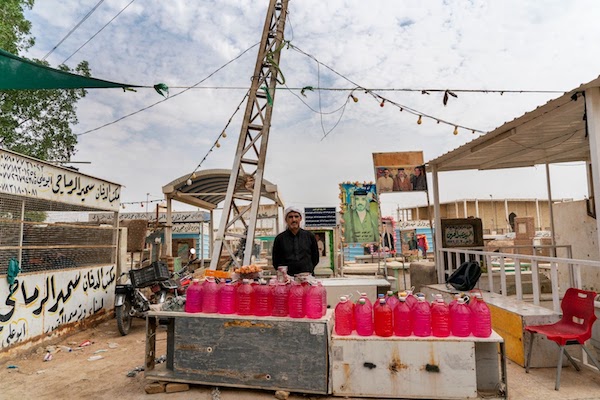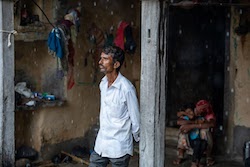SEJournal Online is the digital news magazine of the Society of Environmental Journalists. Learn more about SEJournal Online, including submission, subscription and advertising information.
 |
| Former farmer Ali Sahib Hussein, above, sells holy water and incense in a cemetery in Najaf, Iraq. Drought and desertification have forced Hussein and many others to abandon farms that have been in their families for generations to find work in cities. Photo: Susan Schulman. |
Feature: Journalism Industry Program Supports Reporting on Workers — and Work — in a Warming World
By Christine Spolar
Reporting on climate change often means documenting catastrophes as they happen: storm surges, floods, droughts that spur interest for a week or two. But freelancers, as well as news organizations, can go deeper — to illustrate how lives, jobs and economic stability are at stake as the climate changes.
Employers are realizing profits are vulnerable as the world heats up. Farm workers are finding traditional crops — wheat, rice, soybeans — are no longer reliable harvests. Industries in the Global South are struggling with the greatest loss now, but their experiences may be the most apparent warning of a deterioration in global sustainability.
In order to support reporting that explores how these global climate risks are playing out on the ground and in company boardrooms, the Pulitzer Center on Crisis Reporting this year has offered a new reporting funding initiative, Your Work/Environment.
In the past eight months, the Your Work/Environment initiative has funded more than a dozen projects, from Egypt to India to Iraq, to help journalists document problems and possible solutions.
Grantees have looked at how farmers in Egypt are using smartphone technology to monitor water supply and irrigation. They have talked to women in Africa who are working with nonprofit groups to encourage sustainability by systematically planting crops and trees that prevent erosion. And they have reported on Qatar’s experience as one of the first countries to track heat stress and to limit work hours during extreme heat, while also raising the question of what happens if and when employers violate the new standards.
Here’s a look at two Your Work/Environment grantees who, in the run-up to COP27, have been traveling to track job losses and unprecedented migrations tied to climate change.
‘Climate was always part of my coverage’
Bhasker Tripathi, who has crisscrossed his native India, examining season-upon-season ruin in the fields, grew up in a rural area near Lucknow, the capital and largest city in the state of Uttar Pradesh. He landed his first journalism job in 2012, at the Gaon Connection, then a new Hindi-language media outlet aimed at rural audiences.
 |
| Amritlal Patel is one of India's 140 million farmers, 80% of whom are small-scale and marginalized. Climate change is adding to perennial issues that keep them poor and debt-ridden, driving down their incomes and pushing them into migratory lives. Photo: Danish Qazi. |
“The process was life-changing,” he said. He saw a news organization “built from scratch” and “there is nothing that can teach you more about news than that.”
For Tripathi as a young reporter still in training, agriculture was a natural beat.
“I would be reporting from village to village and reporting there how agriculture was being lost,” he said. “Climate was always part of my coverage.”
By 2018, Tripathi was focusing on data journalism, working for Land Conflict Watch, a data-research project that maps and analyzes land conflicts in India, and then for IndiaSpend, a nonprofit that uses open data as a news source to foster accountability and transparency in business and government. IndiaSpend editors added energy as part of Tripathi’s beat coverage and he began learning about carbon offsets.
“Before, I could make links between climate change and agriculture, but now I was learning about what was happening in the coal industry — the energy needed and the carbon — and it’s all linked,” explained Tripathi. “I realized: You need to report on the intersections. You need to make the linkages in your writing. I found myself on a journey. I mean, what does it mean to shut a coal plant? Who are the people it impacts? You need to open up your lens and see what is really happening.”
In the past couple of years, notably during the COVID-19 pandemic, he enhanced other reporting tools, learning how to better examine the financial promises behind corporate sustainability goals.
He aimed to acquire skills to follow the “hard findings of climate change.”
What it means to leave everything
Tripathi knows he benefits from the values of “a family that was the first generation out of a village.”
“My life has prepared me to not miss the nuances of what it means to leave everything. I can’t ignore the human part of the story,” he said. “The person is making an economic decision — climate has ruined his crop — but what about his wife who has to now take care of five children, the house, the in-laws, the livestock? She has to do all of it alone. There are children in India practically growing up without a father. You can’t ignore that.”
This year, Tripathi began strategizing about how climate could be the basis for a fulltime news platform and he made the Pulitzer Center part of his effort. He spent three months researching a proposal to document what he sees as an evolving migration within India, a movement of labor that businesses, policymakers and educators will have to manage.
‘I am not driven by a flood or a landslide.
I see climate as a topic that needs to be reported
in a democracy, through all its processes, whether
it involves property or business or migration patterns.’
— Bhasker Tripathi
“I am not driven by a flood or a landslide. I see climate as a topic that needs to be reported in a democracy, through all its processes, whether it involves property or business or migration patterns,” he said.
The Pulitzer Center has provided funds for Tripathi and Mahima Jain, an independent, India-based journalist, to travel for stories that will document the cascading needs from a largely undocumented migration.
The Morning Context, an online site in India that caters to a high-end business and academic readership, has begun to publish their stories in English and make them all free to read, beyond its regular paywall.
Following a trail forced by climate change
Susan Schulman, an award-winning photojournalist who has reported from Iraq for decades, returned this summer to follow a trail of farmers who are abandoning land that is no longer arable and heading for cities in search of jobs.
Schulman had just finished a reporting trip to track water problems in Iraq for the Royal United Services Institute, better known as RUSI, when she began considering how drought and water scarcity were examples of climate-based threats jeopardizing stability in the country of 40 million people.
She wanted to return to southern Iraq to document what she viewed as an historic migration from farm to city, a trail forced by climate change.
She applied to the Pulitzer Center for a Your Work/Environment grant to travel from London, her home base, to Najaf, Basra, Amarah and other towns to report stories and a photo essay for RUSI and The Guardian in the United Kingdom.
‘Everybody told me the same story:
that they were being forced to abandon
farms that had been in families for generations.’
— Susan Schulman
“I felt like it was necessary to report this,” Schulman said. “I just had done a story on water scarcity in Iraq and everybody told me the same story: that they were being forced to abandon farms that had been in families for generations. … A wave of people moving into towns struck me as something that was really important to report.”
Schulman said the Pulitzer Center grant was essential for her to pursue more robust reporting in a country that is battered by war and continues to struggle economically and politically.
“It’s really hard to sell a story that requires travel,” she said. “It’s a lot easier when the logistics are paid for.”
Laying the groundwork for a successful grant application
Schulman covered the U.S.-led invasion of Iraq in 2003, and she was familiar with the customs and traditions in the largely Islamic country. When the COVID-19 pandemic prompted a government-mandated shutdown across Europe, she filled some of her quiet days with online Arabic lessons.
All that experience helped her better report on broad climate change disruption in Iraqi society.
Before Schulman applied to the Pulitzer Center, she did extensive phone interviews with regional experts to map her reporting plans.
This August, she traveled into Iraq with some remarkable data from the International Organization for Migration, or IOM, the U.N. agency that provides and monitors services for displaced persons and refugees.
In March 2022, IOM reported 3,358 families or 20,148 individuals in Iraq were water- or climate-displaced. That figure was from an IOM survey completed in 10 of Iraq’s 19 governing districts. In June, IOM repeated its survey, in the same districts, and found 34,602 individuals now identified themselves as migrants — a 72 percent increase within months.
“We are talking about a problem that is not just increasing, but one that is increasing at a significant rate,” Schulman said.
Challenging climate change myopia
“It is easy to underestimate what leaving their communities means,” Schulman said. “Until you speak to them, you might not understand how this changes everything. In particular, women become extremely isolated.”
Beyond migration, work itself changes, she said. Men are leaving farms to find some of the lowest-wage jobs on the outskirts of major cities, she said. Some get by selling holy water on roadsides or in cemeteries. Others become street cleaners, picking up rubbish by hand.
Schulman also found that the woes of migration are not confined to the displaced people. Doctors and hospitals are coping with spiraling health needs in the cities. Teachers are beginning their school year with dozens more students in every classroom. Police say crime, including smuggling, is escalating.
“There is a myopia on climate change right now,” Schulman said. “People think ‘Oh, that’s Iraq. That’s not my life.’ Well, that’s shortsighted. It is going to affect all of us in the same way. There’s a failure to address climate stress on systems and how to accommodate and retrain people.”
[Editor’s Note: Interested in applying for a Pulitzer Center grant? Here’s how.]
Christine Spolar is the climate/labor editor at The Pulitzer Center for Crisis Reporting. A journalist for decades, she has been a staff reporter and editor for the Financial Times, Kaiser Health News, The New York Times and The Washington Post. She has been an investigative reporter and editor as well as a foreign correspondent, and she continues to report on health, economics, climate and politics.
* From the weekly news magazine SEJournal Online, Vol. 7, No. 41. Content from each new issue of SEJournal Online is available to the public via the SEJournal Online main page. Subscribe to the e-newsletter here. And see past issues of the SEJournal archived here.













